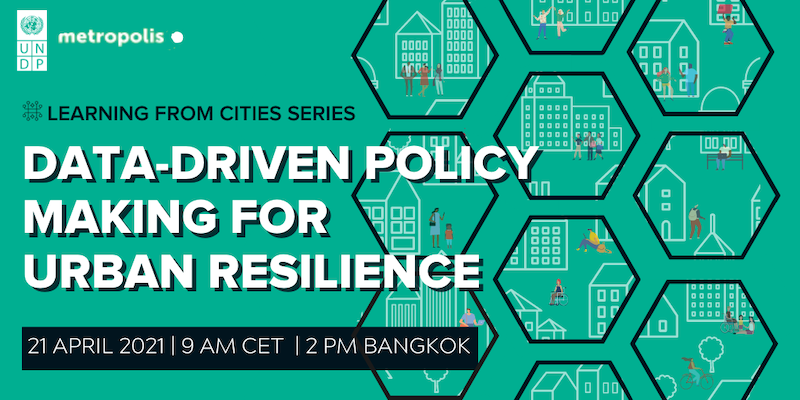Learning from Cities Series: Data-Driven Policy Making for Urban Resilience
Date and Time: 21 April 2021 | 9 - 10 AM Central European Time (CET) | 2 -3 PM Bangkok Time
Registration Link: https://undp.zoom.us/meeting/register/tZYsde-qrT4vHdbNGt8xMJWJYbTEJT_OmqsA
BACKGROUND
The joint UNDP – Metropolis series "Learning from cities" highlights city and metropolitan solutions and insights on pressing issues, linked both to the COVID-19 pandemic and the need to adapt to a world in constant change.
In 2050, almost 70% of the world population will be living in cities. While people move to cities seeking commercial and economic opportunities, vulnerability to shocks and crises is increasing in urban settings. The COVID-19 pandemic has further exposed cities’ fragility and tested their capacities to adapt to such disruptions.
To minimize the cascading impacts of shocks and stressors, cities are working to build resilience and adaptive capacity to:
- Effectively prepare for disasters and emergencies;
- Manage uncertainty, complexity and new planning frameworks, and
- Adapt to disruptive scenarios.
Local and metropolitan governments are realizing how important is to have scaled and evidence-based data to inform their decision-making to prevent risks and increase response.
With the smart integration of urban data and management via the digital transformation and the advancement of sensory technology, such data-driven policymaking can be a key pillar of the adaptive resilience of cities. As an example: refined local climate and disaster risk data can help understanding vulnerabilities and inform land use development patterns and zoning. Islamabad, in Pakistan, has recently piloted the implementation of smart water metering systems that helps the municipality setting the right price for water and also reduce water usage.
In the last year, the application and use of digital technologies have taken an even greater leap forward, as people changed their way to access services and interact with others during the COVID-19 pandemic. The potential of urban information systems, such as digital mobility records and cloud medical platforms, can significantly enhance cities’ understanding of residents’ resilience and wellbeing.
UNDP is currently supporting four Asian municipalities1 to adopt a systemic approach to climate and disaster risk assessment, creating localized “roadmaps” to guide future municipal investments to build resilience and reduce risks. One of the actions identified to improve their existing development plans promotes the integration of urban data (i.e. vulnerability and risk information, smart water metering system, and disaster early warning systems) as success criteria for the roadmap.
OBJECTIVES
This second Learning from cities explores how local governments are using data to make better decisions and build urban resilience. The event will focus on:
- Understanding better how data-driven policies help to create resilience to urban crises and shocks;
- Sharing experiences in integrating data-driven policymaking into cities’ urban resilience roadmaps; and
- Elaborating recommendations and lessons learned based on local experience.
KEY QUESTIONS FOR DISCUSSION
- How can open data platforms help municipalities and metropolitan governments to advance building urban resilience?
- How can future projections of disasters and climate risks be taken into consideration in urban planning and local policy?
- How can vulnerable populations and the urban poor be engaged in informing policy-making in ways that are equitable and inclusive?
- What kind of partnerships with private/public entities (technology, mobile providers, etc.) can be established?
- How can cities and metropolitan governments use digitalization and data to support community engagement and ensure the implementation of inclusive urban resiliency policies?
- How using big data sets has been helpful for cities to track resilience trends and make evidence-based policy decisions?
TENTATIVE AGENDA (Total time - approximately 60 min)
- Presentation of the “Learning from cities” UNDP-Metropolis series by UNDP Representative (2 minutes)
- Introduction to the theme by Petr Suska, Head of Urban Economy Innovation, Fraunhofer Institute, and also Moderator of the event (10 minutes)
- Presentation by Guangzhou, China (10 minutes)
- Follow up comments and questions by the moderator (5 minutes)
- Presentation by the city of Rawalpindi, Pakistan (10 minutes)
- Follow up comments and questions by the moderator (5 minutes)
- Q&A with the public through the chat (15 minutes)
- Wrap up comments and recommendations by Octavi de la Varga, Secretary-General of Metropolis (4 minutes)
ADDITIONAL DETAILS
The event is addressed to local decision-makers, city planners, practitioners, civil organizations, academia, and local government networks. While the experiences will focus on Asia-Pacific, the event is open to all regions in the world.
The event will consist of a Webinar with live participation from the public via chat. The webinar will subsequently be made available in Youtube as well as transformed into a podcast for further availability of the contents in other time zones.
Registration will be required by participants in Zoom. Dissemination of the event will be done through both Metropolis and UNDP mailing lists and Twitter accounts @UNDP4urban and @metropolis_org.
